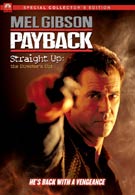The term “Director’s Cut” gets tossed around so frequently now that it’s almost lost all meaning. Aren’t most films that are released cut by the director? Just adding a few seconds that were trimmed for a better rating and calling it a new cut is hardly a new edit of the film. Unlike many of the misleading releases these days, the director’s cut of Payback is actually a completely different film than the theatrical cut that has been around for years now. The story may be similar and the two may share quite a few scenes, but the entire tone and approach of the film is different, creating one of the better director’s cuts to be released. The original advertising campaign for Payback was “Get Ready to Root For the Bad Guy,” and with good reason. None of the characters in Brian Helgeland’s adaptation of Donald Westlake’s novel The Hunter are good guys. Even the film’s protagonist, Porter (Mel Gibson) is rough around the edges. Actually, that’s putting things lightly. The thug isn’t above beating the crap out of women, let alone smashing faces and taking on a crime syndicate – not because he wants to take them down, but because he wants money back they owe him. The sum? A measly $70,000. But the principle of the matter is what matters to Porter, and he’ll destroy everything that gets in the way of getting his money back.
Opposing Porter is a veritable who’s who of working actors. Gregg Henry brings his slimy demeanor to Val Resnick, a former associate of Porter’s who is actually the one responsible for Porter’s money and this whole story. While Porter was out of the picture, however, Resnick bought himself backing from a crime syndicate whose associates include William Devane, John Glover, David Paymer, and the scene stealing James Coburn. Along the way Porter encounters crooked cops (Bill Duke and Jack Conley), a sadomasochistic mistress (Lucy Liu), and former love interests (Maria Bello and Deborah Kara Unger).
Payback has been out for years and, while it was a movie I guiltily enjoyed, I always felt it was a bit weak. The film had some guts following around a character who wasn’t very appealing (this was before 2005’s Sin City which took that idea to the next level). But the story didn’t take many chances. Porter kind of eased his way from situation to situation, allowing Mel Gibson to charm his way through much of the movie, enhanced by a voice over narration that gave Gibson the chance to make Lethal Weaponesque memorable quips. However, this is not that movie.
This Director’s Cut is Brian Helgeland’s original vision of the movie, as both writer and director. Helgeland’s original cut of the film didn’t test well – for even better reasons than the ad campaign’s appropriateness. In 1999 people weren’t ready for Mel Gibson to play such a rough, brutal character. In Helgeland’s version, Porter is a much more vicious beast. If there’s any doubt, his first exchange with his drug-addled wife should remove it. Porter, upon discovering the track marks on her arms, tosses her around the kitchen like a rag doll. While she does a little to try and defend herself, for the most part it’s two minutes of Porter savagely beating a defenseless woman. It’s not the only time he takes to such brutality either.
Gone from this cut is the Gibson friendly voice over as well. Helgeland loses a little of the noir-ish feel by removing Porter’s inner thoughts, but the sacrifice is well worth it. Instead of watching Mel Gibson play another similar character, Porter finally begins to have some definition that’s lacking from the original film. This is a man driven, but without knowing what’s going on inside his head, we don’t know just what it is that’s driving him. That adds intrigue to the character that was lacking before.
The shape of the organization Porter takes on in Helgeland’s cut changes slightly as well. In this edit of the story, Kris Kristofferson’s boss character is completely removed and we never see the true head of the organization. The only sign of her that we get is a feminine voice on the phone as Porter makes his way through other members of the syndicate in his quest to get his money back.
Helgeland’s cut of Payback didn’t test well with audiences at the time and it’s easy to see why. Thankfully Gibson’s charming façade has begun to crumble over time, both through his own antics and through his expansion as an actor and director. Now people don’t feel the need to see Martin Riggs in every role Gibson plays. I think Helgeland’s edit of the movie is a much more solid film, both as a story and as a film, and probably would be more acceptable eight years after the picture’s initial 1999 release. It’s still not a perfect film, and personally I prefer more redeemable characters, but it’s a better version of a picture that was already on my list of guilty pleasure movies. As I mentioned above, Director’s Cut releases are frequently disappointing ventures on DVD, barely being different from the original edition. Just as this new cut of Payback is drastically different from the original movie, “Payback - Straight Up” is a drastically different DVD release – a release that offers more than just the new movie, but a solid look behind the scenes of the film being made, and remade.
Your Daily Blend of Entertainment News
The double featurette, “Paybacks are a Bitch” gives quite a bit of information about the making of the film and there’s certainly a lot to be told. The movie was Helgeland’s directorial debut. The writer-turned-director learned a lot on the set of Conspiracy Theory, part of how he got involved with Gibson, and it’s fascinating to hear Helgeland talk about his relationship with Richard Donner who served as quite the mentor figure. The featurette is broken into two parts, one for each of the two locations the movie was shot in, although the content isn’t limited just to those shooting locations. Quite a bit of time is spent on how the movie came to be, and some focus is on the costumes and character development, so don’t be thrown by the “On Location in Chicago / On Set in Los Angeles” titles.
My biggest complaint on movies like this is not having an easy way to tell what has been changed from the original edit of the picture without having an obsessive knowledge of the movie. “Straight Up” doesn’t completely appease that complaint, but it does offer a featurette that explains some of the changes in Helgeland’s cut. “Same Story, Different Movie” might as well be a third piece to “Payback is a Bitch.” It also features surprisingly friendly retrospective interviews with Helgeland and Castro-beard wearing Gibson as they explain why Payback was changed from Helgeland’s original vision. Quite a bit of time is also spent on the process the director went through to create this edit. It’s not just a matter of finding the original footage and recutting it, but creating a new score and using a different process on the film than the original version did, resulting in a different tone for the movie entirely. If the featurette doesn’t offer enough information of Helgeland’s thought process both originally and with the new cut, his commentary track on the film is quite informative and his excitement about the movie, despite all he has been through, is almost tangible.
The last of the bonus material is a brief interview with Donald E. Westlake, the author of The Hunter, the novel on which Payback is based. Westlake explains his use of pseudonym Richard Stark in the Parker novels (the character’s name was changed for the film) and gives information about the other stories he’s told with the character. It’s probably the least interesting of the extras, primarily because it’s only loosely connected with the movie and really has nothing to do with this director’s cut.
As a movie Payback has limited appeal, primarily sticking to those who like their action darker and aren’t afraid of a good anti-hero. As a DVD, however, this is an excellent presentation of an even better version of the film. If that’s up your alley or you’ve seen Payback before, this is worth checking out, if only to determine which version of the story you like better and learn a little more about the politics behind the film and the surprising good nature everyone seems to have about it now.

